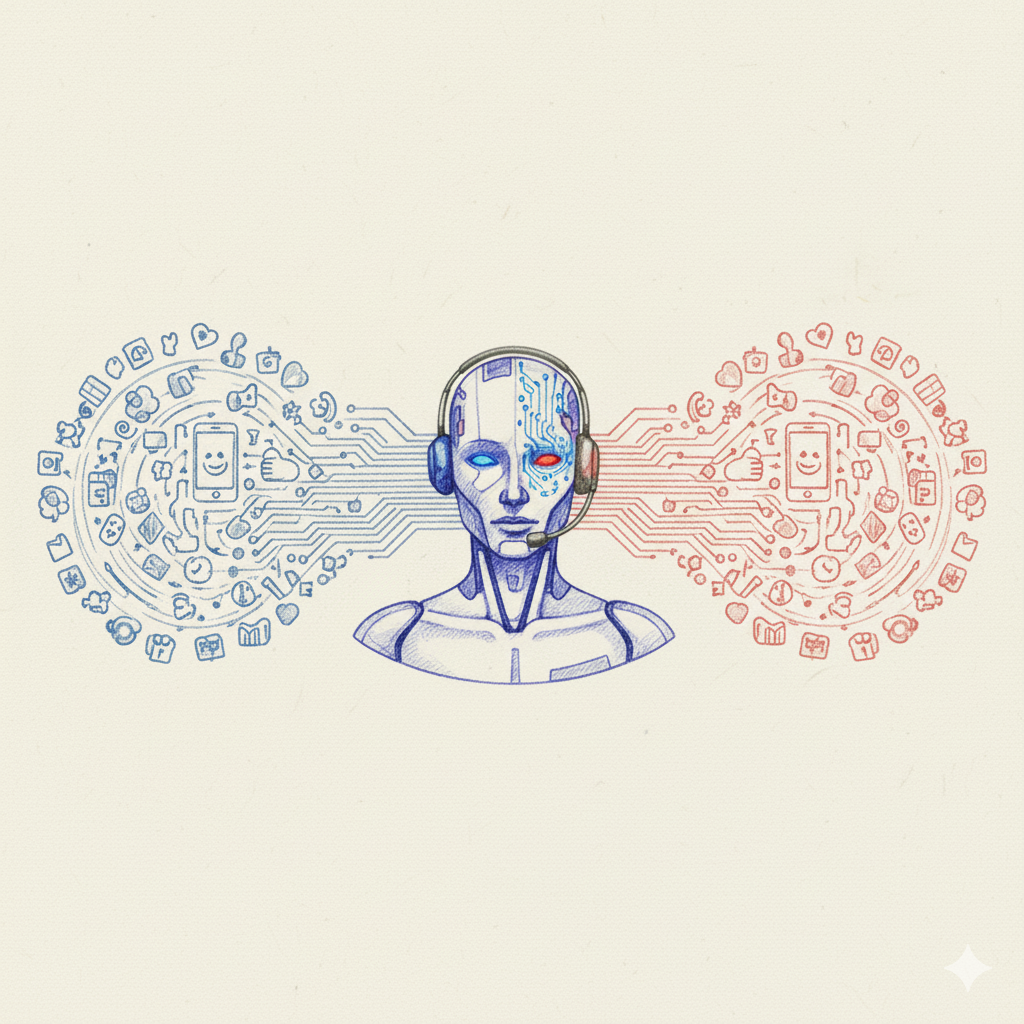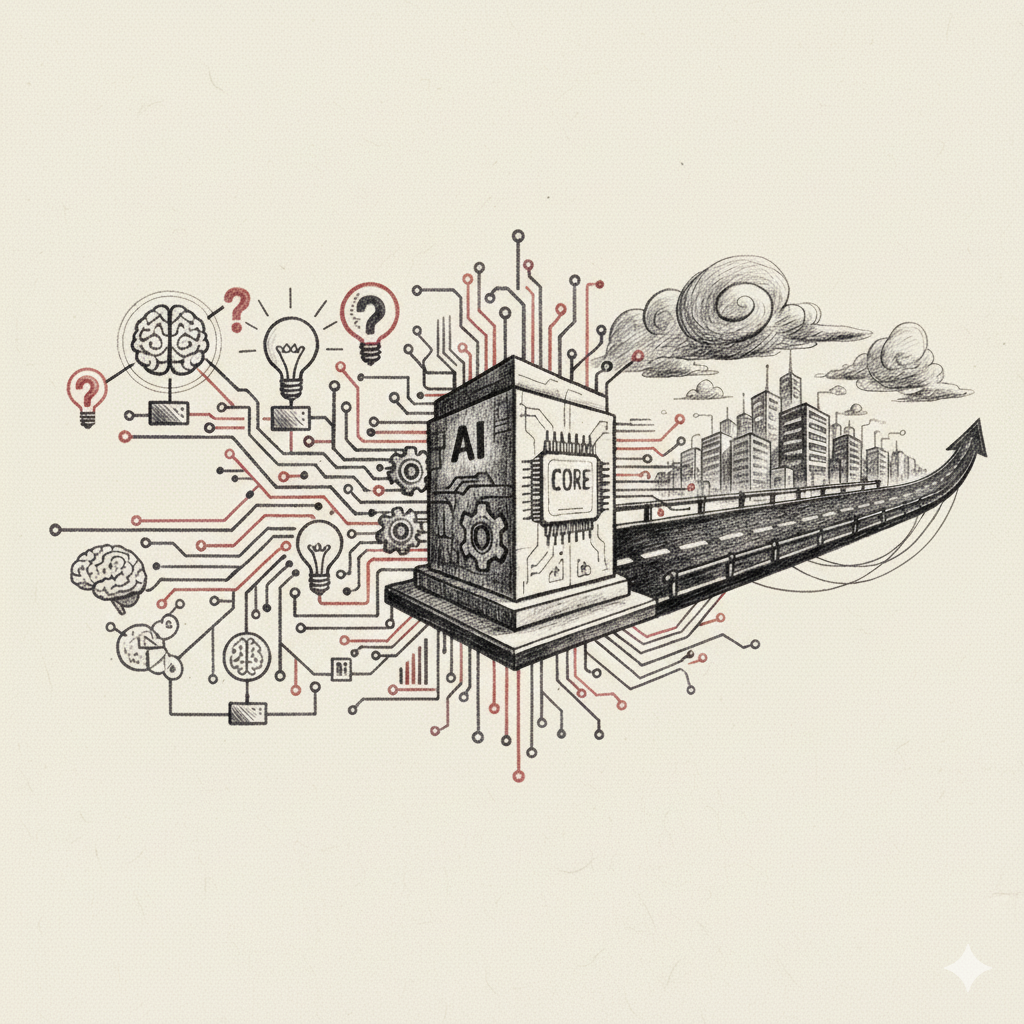AI in Customer Experience: Turning Data Into Delight
AI is redefining customer experience through intelligent design and data-driven insights. Explore real-world AI solutions, use cases, and expert consulting that elevate engagement.

In recent years, businesses have realized that excellent customer experience is a differentiator. As competition intensifies, organizations are turning to technology to respond, predict, and delight customers at every touchpoint. At the heart of this shift lies AI customer experience, an arena where artificial intelligence powers personalization, automation, and proactive service.
But moving from ambition to real impact demands more than simply adopting the newest tool. Companies must build a clear strategy with AI strategy consulting tools/partners, and chart a roadmap through execution.
This blog explores how to turn data into delight, surveying real-world AI use cases, strategies, and the roles of AI automation services, workflow automation, and an effective AI consulting team. Whether you are just beginning or refining your approach, this post offers research-backed insight and actionable guidance.
Why AI Matters for Customer Experience
Customer expectations have evolved quickly. Study predicts that by 2025, 89 percent of businesses will compete primarily on experience, not just product or price. 77 percent of customer experience teams already use AI to improve response times, satisfaction, and cost efficiency. Meanwhile, mature adopters of AI-driven customer service report 17 percent higher customer satisfaction.
These data points confirm that integrating AI into CX is no fad; it is becoming a central business lever. But to reap the benefits, this integration must be strategic, measured, and aligned with business goals.
Key AI Use Cases for Customer Experience
Understanding how AI applies in practice is essential. Here are several AI use cases that deliver meaningful impact:
1. Conversational Agents and Chatbots
Chatbots are among the most common entry points for AI customer experience solutions. They can handle routine queries 24/7, freeing human agents for more complex issues. Companies using virtual agents have experienced cost reductions in customer service operations.
2. Next Best Action Recommendations
AI models can analyze customer behavior and predict what a user might want next, such as an offer, content, or an assistant’s service. This “next best experience” model not only improves engagement but also reduces service load and increases cross-sell or retention.
3. Sentiment Analysis and Feedback Understanding
By applying natural language processing, companies can parse open-text feedback (reviews, support tickets, social media) to detect dissatisfaction, trends, or churn risk. This insight drives faster responses and process improvements.
4. Proactive Issue Detection
Instead of waiting for customer complaints, AI can monitor telemetry, usage signals, or system logs to flag problems before they surface. For example, AI in post-sales support can detect anomalies and automatically trigger service actions.
5. Workflow Automation and Agent Assist
Behind the scenes, AI automation services manage ticket categorization, routing, and knowledge retrieval. Combined with a smart AI consulting team, AI can serve as a co-pilot, helping agents with context, suggestions, or summarization.
These use cases span front-end experiences, operational efficiency, and deeper customer insights. The trick is to pick those aligned with your goals and execute them well.
Building an Effective AI Strategy
Deploying AI haphazardly can do more harm than good. A robust AI strategy consulting approach helps you sequence efforts and manage risk. Key steps include:
Define Goals and Metrics
Start by clarifying business objectives. For example, reduce support costs, raise NPS, boost retention, or increase conversion. Tie each use case to measurable metrics such as resolution time or CSAT, etc.
Assess Data Readiness
AI relies on quality, clean, and connected data. Assess your data infrastructure, identify silos, and ensure governance is in place. Without data readiness, AI implementation can cause data-related complexities.
Select the Right AI Implementation Partner
An external or internal AI implementation partner should bring domain experience, technical skill, and a collaborative mindset. They help avoid the common pitfalls of overpromising and underdelivering.
Pilot with High-Impact Use Cases
Begin with small-scale, fast-win use cases such as chatbots or routing automation before scaling to more ambitious scenarios. This reduces risk and builds stakeholder confidence.
Scale and Operationalize
Once pilots succeed, build an AI roadmap services plan. This includes rollout sequencing, monitoring, feedback loops, and continuous improvement.
Cultivate an AI Consulting Team
Whether in-house or external, your AI consulting team must include domain experts, data scientists, UX designers, and change champions. Their job is not just to build models but to integrate AI into business workflows.
Embed Workflow Automation
To capture full efficiency, implement AI automation services and workflow automation across departments. Automating manual steps ensures AI becomes part of everyday operations, not a parallel experiment.
Challenges and Pitfalls to Watch
Implementing AI customer experience solutions can yield immense benefits, but success depends on overcoming a few critical challenges that often derail even the best-planned projects. Understanding these barriers early helps ensure your investment delivers lasting value.
Trust and Transparency
Customers value honesty and clarity when interacting with brands. When AI tools such as chatbots or recommendation engines are involved, transparency becomes essential. Many users feel uneasy or even misled if they realize later that they were communicating with an AI system rather than a human. To maintain trust, organizations should disclose when AI is being used, clearly explain how it benefits the user, and always provide the option to connect with a human agent when necessary. Maintaining human handovers at key points, such as conflict resolution or billing, ensures customers feel supported and respected. Transparency is not just ethical; it strengthens brand credibility and customer confidence in automated systems.
Bias and Fairness
AI models are only as unbiased as the data they learn from. If training data reflects social, gender, or demographic biases, the resulting recommendations or responses will also be skewed. In customer service contexts, this can lead to unequal treatment, such as certain groups receiving slower support or less favorable resolutions. Regular auditing of models for fairness and performance helps identify hidden biases before they escalate. Establishing ethical AI review boards, applying explainable AI frameworks, and retraining models with diverse, representative datasets are all essential steps toward fairness. In the age of personalization, fairness in AI is a business imperative.
Integration Complexity
Deploying AI across customer experience platforms rarely happens in isolation. Most enterprises run on a patchwork of legacy systems, customer relationship management (CRM) tools, ticketing software, and data warehouses. Integrating AI into these systems can be technically complex and resource-intensive. Inconsistent data formats, outdated APIs, or siloed information can slow performance and limit insights. To overcome this, organizations should invest in robust integration planning early in the AI implementation journey. Modern middleware tools, data lakes, and API-driven architectures can simplify this process and ensure that AI systems communicate seamlessly with existing workflows. Without strong integration, even the most advanced AI tools may underperform or create new inefficiencies.
Change Management
Technology adoption is as much about people as it is about systems. Employees, especially customer service agents, may resist AI-driven tools out of fear that automation will replace them or make their work redundant. This resistance can stall progress or reduce adoption rates. Successful organizations handle this by involving teams early in the design and testing process, highlighting how AI enhances rather than replaces human roles. Regular training sessions, internal feedback loops, and transparent communication about goals and benefits build confidence. When employees see AI as an ally that reduces repetitive work and enhances decision-making, they are more likely to embrace it enthusiastically.
Lack of Measurement Discipline
Many companies invest in AI without defining what success actually looks like. Without proper metrics, governance, and continuous monitoring, AI initiatives risk losing direction or credibility. Measurement discipline involves identifying key performance indicators (KPIs) that reflect business impact, such as reduced average handling time, higher customer satisfaction, or lower churn rates, and tracking them consistently. It also requires governance frameworks to oversee data quality, compliance, and model drift. An ongoing feedback mechanism between data teams, business leaders, and customer service departments ensures AI systems evolve alongside organizational needs. Without these practices, even promising AI deployments can stagnate, producing minimal value over time.
Together, these challenges highlight that AI customer experience transformation is as much about ethics, collaboration, and structure as it is about technology. By building trust, ensuring fairness, integrating seamlessly, managing change, and maintaining strong measurement discipline, organizations can turn AI from a complex project into a powerful driver of customer delight.
Conclusion
The promise of AI customer experience is powerful: smarter, faster, more personal interactions powered by insight from data. The journey is not trivial; it requires deliberate strategy, alignment, and execution. When done right, it yields improved satisfaction, reduced costs, and stronger customer loyalty.
If you are ready to design your AI roadmap services, identify the right AI implementation partner, or build an AI consulting team to deliver real-world AI solutions, let’s talk. Visit our website or connect with us to explore how we can transform your customer experience with AI.
FAQ
1: What is AI customer experience, and why is it important?
AI customer experience refers to applying artificial intelligence across customer touchpoints to enhance personalization, speed, and insight. It matters because customers now expect seamless, predictive, and efficient service. The data shows that organizations leveraging AI report higher satisfaction and lower support costs.
2: How do I choose the right AI use case to start with?
Begin with pain points that are well understood and measurable, such as reducing response time, automating FAQs, or predictive service. Use cases with clear ROI and manageable scope make good pilots before scaling to more complex scenarios.
3: What role does an AI implementation partner play?
An AI implementation partner helps translate business goals into models, integrate AI into existing systems, manage data pipelines, and ensure sustainable deployment. They also help avoid pitfalls and accelerate delivery.
4: How does workflow automation complement customer-facing AI?
Workflow automation handles internal processes such as ticket routing, escalations, and knowledge lookup, reducing manual steps. When AI powers both front-end and back-end flows, the full system is more efficient and coherent.
5: How can I measure success for AI in customer experience?
Tie success metrics to business goals such as resolution time, first contact resolution, CSAT/NPS, cost per ticket, retention, upsell, and customer churn. Monitor before, during, and after deployment to validate impact and iterate.



